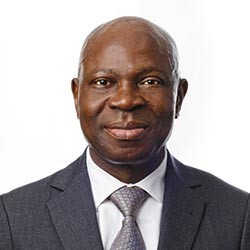Tackling Food Insecurity: The Challenge and Call to Action, U.S. Treasury Event Statement by Gilbert F. Houngbo President of IFAD
IFAD Asset Request Portlet
ناشر الأصول
Tackling Food Insecurity: The Challenge and Call to Action, U.S. Treasury Event - Statement by Gilbert F. Houngbo President of IFAD
19 أبريل 2022Check against delivery
As COVID, climate change, and now conflict in the Ukraine have shown -- our world is complex, volatile, and connected.
Shock after shock, there are the poor women and men of the developing world who are hit the hardest.
Hunger has been slowly on the rise since 2014. COVID exacerbated this trend and last year, between 720 to 811 million people were already facing hunger. Estimates indicate that the current crisis could increase this number by anywhere from 7.6 million to 13.1 million.
Yesterday it was COVID. Today, Ukraine. And we know this will not be the last global crisis.
I welcome the recent announcements by the IMF (Resilience and Sustainability Trust, RST) and the World Bank (170 billion response envelop). They are significant steps forward. My deep concern is how to ensure these investments reach the neediest people.
Let me recall that 80 per cent of the women, children and men living in extreme poverty live in rural areas, not cities. What is missing from the picture is long term investments in resilience at the local level.
Imagine you are a farmer in Somalia with small diesel engine to irrigate your crops. In a country where 68 per cent of the population live on less than 2 dollars a day. Where nearly 4 million people are already food insecure, and where drought and erratic rainfall have plagued farmers for years. With fuel prices spiking, how will you water your crops and expect the same yield? How will you feed your family? How will you survive?
And if you are a baker in Ghana, a country that imports 30 per cent of its wheat from Russia? How would you keep working when you face both a disruption of the supply of wheat and, if available, inaccessible prices? You’re left with either having to close your business or significantly increase the price of bread. And who will be able to buy it?
In this sense, we should not neglect the necessity to encourage transformation of local grains and local consumption. Particularly given that these small-scale farmers produce almost one-third of all food calories and play a key role in global food systems.
We also need investments, policies and programmes to strengthen regional and local food markets – and the farmers who supply these markets.
These long term investments, at the local, micro level, are as important as those at the macro level.
On the hard side, by improving access to inputs, services, finance and infrastructure.
On the policy side, by easing tariffs in local and regional markets and continuing to lift non-tariff barriers.
And on the soft side, by investing in social protection, particularly for girls and women, and ensuring the small-scale producers receive a decent income, a fair share for their production.
We welcome the ongoing initiatives, such as the work of the IMF on Special Drawing Rights; the FARM initiative launched by the EU Presidency; and the Mission 1 for 200 financing facility for food and nutrition in Africa.
I look forward to working with you to minimize suffering and build long term resilience.
